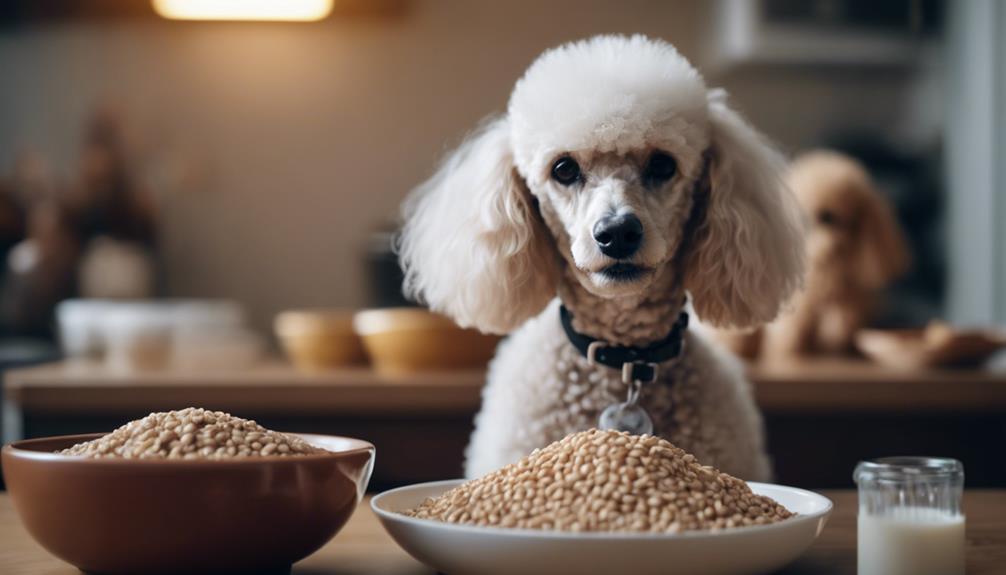If you've ever pondered whether a grain-free diet could be beneficial for your Poodle, it's crucial to weigh the advantages and disadvantages carefully. While the idea of improved digestion and increased vitality sound appealing, there are nuances to consider. From potential nutrient imbalances to higher expenses, the decision isn't as straightforward as it may seem. But before you make any adjustments, a deeper look into the implications and expert insights might just be what you need to make an informed choice for your furry companion.
Key Takeaways
- Health benefits include weight management, energy increase, and improved digestion.
- Specific benefits cater to diabetic, cancer-affected, and active Poodles.
- Cost considerations highlight the potential financial impact of grain-free diets.
- Nutritional aspects emphasize enhanced absorption but caution against imbalances and health risks.
Health Benefits of Grain-Free Diet
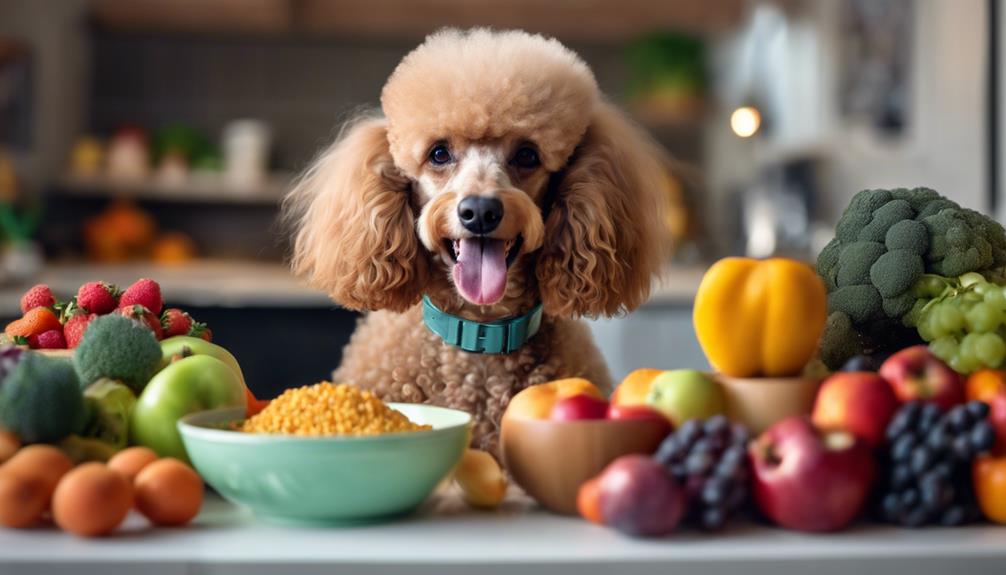
Switching your Poodle to a grain-free diet can offer various health benefits that contribute to their overall well-being. Grain-free dog food can play a crucial role in weight management for Poodles. By eliminating grains from their diet, you can help your furry friend maintain a healthy weight, reducing the risk of obesity and related health issues. Additionally, a grain-free diet can aid in managing allergies that your Poodle may have developed from consuming grain-based foods.
Furthermore, a grain-free diet can lead to increased energy levels in Poodles. With the right balance of nutrients from grain-free options, your dog may experience a boost in vitality and overall activity levels. Moreover, this type of diet can help reduce flatulence in Poodles, providing relief for both your pet and your household. Overall, the health benefits of a grain-free diet extend beyond weight management and allergies, contributing to a happier and healthier life for your beloved Poodle.
Improved Digestion in Poodles
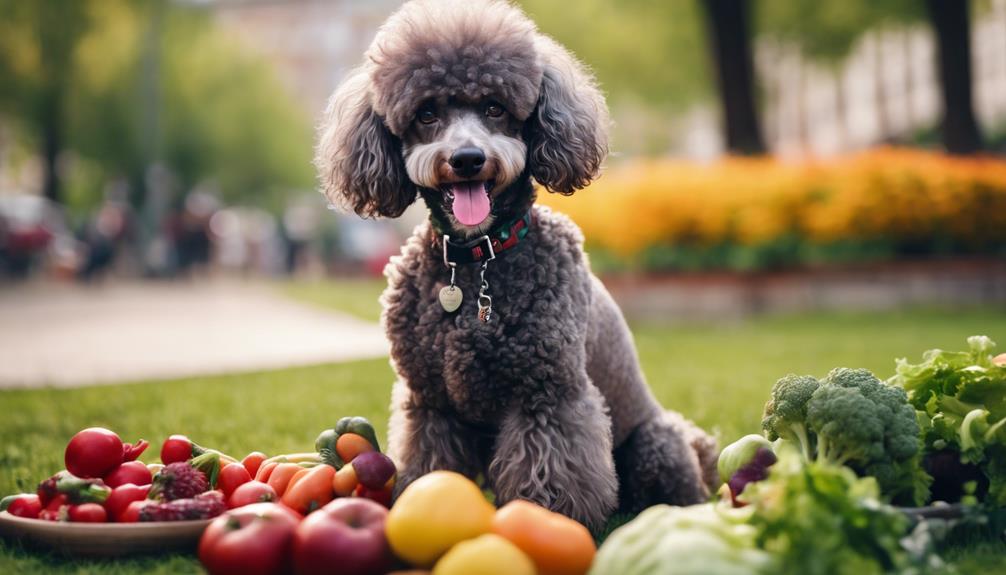
Switching your poodle to a grain-free diet could potentially enhance their digestion by reducing the likelihood of stomach problems. With grain-free options rich in easily digestible ingredients like sweet potatoes and peas, your poodle may experience fewer digestive upsets and firmer stools. By opting for a grain-free diet, you are aiming to promote better gastrointestinal health in your beloved poodle.
Digestive Health Benefits
When opting for a grain-free diet for your Poodle, you may notice enhanced digestive health, attributed to the absence of potential allergens like gluten. Grain-free options are highly digestible, leading to firmer stools and reduced gastrointestinal issues in poodles with sensitive stomachs or food intolerances. This diet can provide necessary nutrients while supporting optimal nutrient absorption and digestive efficiency, promoting overall digestive health. Poodles on a grain-free diet often show increased energy levels and improved well-being, indicating better digestion. By eliminating grains from your Poodle's diet, you may help them maintain better digestive health and overall vitality. Consider the benefits of a grain-free diet to support your Poodle's digestive system and overall well-being.
Reduced Bloating Issues
Considering the digestive benefits of a grain-free diet for Poodles, a notable improvement includes reduced bloating issues, indicative of enhanced digestion in these dogs. Poodles may experience less gas and gastrointestinal discomfort, promoting overall digestive health. A grain-free diet can be particularly beneficial for Poodles with sensitive stomachs, offering easily digestible options. This dietary change often results in firmer stools and a decrease in digestive upset instances. By supporting a healthier gastrointestinal system, grain-free diets can help minimize bloating and digestive issues commonly associated with grains.
| Grain-Free Diet Benefits for Poodles | ||
|---|---|---|
| Reduced bloating issues | Improved digestion | Less gas and discomfort |
| Healthier gastrointestinal system | Firmer stools | Reduced digestive upset |
Enhanced Nutrient Absorption
To enhance nutrient absorption and improve digestion in Poodles, a grain-free diet can play a crucial role in maintaining their overall health and well-being. Poodles, known for their sensitive digestive systems, may benefit from a grain-free diet as it allows them to absorb nutrients more efficiently. By opting for grain-free options like Health Extension canned food, poodles can reduce the risk of digestive issues and find relief from grain sensitivities or allergies. The absence of grains in their diet not only supports optimal nutrient absorption but also helps in preventing bloating problems. Choosing a grain-free diet tailored to meet the specific needs of Poodles can contribute significantly to their digestive health and overall quality of life. Additionally, incorporating high-quality protein sources and essential fatty acids into their meals can further support their skin and coat health, which is particularly important for Poodles. Consulting a veterinarian for poodle diet and nutrition tips can help ensure their specific dietary requirements are met, promoting long-term health and vitality. With the right balance of nutrients and careful attention to their unique needs, a grain-free diet can be a key component of a Poodle’s overall wellness plan. Furthermore, highprotein diets for poodles can be particularly beneficial in supporting their muscle development and maintaining their active lifestyles. Ensuring their meals are rich in high-quality proteins not only promotes lean muscle mass but also provides the necessary energy to keep up with their playful and energetic nature. Combining a grain-free approach with high-protein options creates a balanced nutrition plan, perfectly suited to address the unique dietary needs of this intelligent and active breed.
Allergy Reduction With Grain-Free Diet
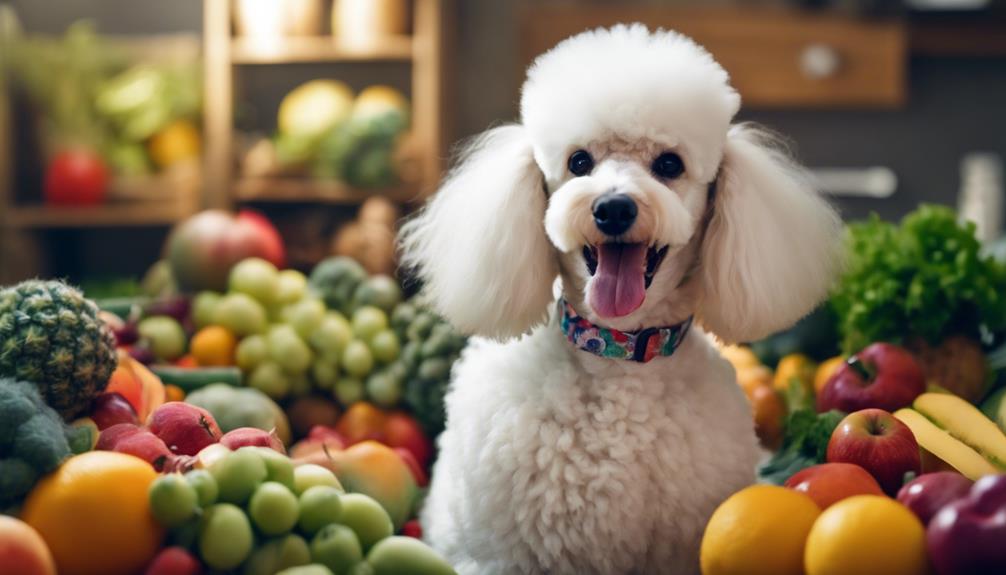
Eliminating common allergens found in grains like wheat, corn, and soy, a grain-free diet can help reduce allergies in Poodles. Poodles with grain sensitivities often experience relief from skin issues and gastrointestinal problems when switched to a grain-free diet. By steering clear of grains that commonly trigger allergic reactions, Poodles may notice improvements in coat health and a decrease in itching or irritation. Grain-free alternatives like sweet potatoes, peas, and lentils offer Poodles alternative carbohydrate sources that reduce allergy risks. It is crucial to consult with a veterinarian to determine if a grain-free diet aligns with your Poodle's specific dietary requirements and health conditions. Making informed choices about your Poodle's diet can lead to a happier, healthier pup with reduced allergy-related discomfort.
Enhanced Activity Levels

Switching your Poodle to a grain-free diet can lead to enhanced activity levels, thanks to the easily digestible protein sources it provides. Poodles on a grain-free diet may experience increased energy levels, encouraging more playtime and exercise. Options like Health Extension canned food are specifically designed to support optimal activity in Poodles. By offering improved digestion, grain-free food aids in better nutrient absorption and utilization, which is essential for active Poodles. Additionally, maintaining a grain-free diet can help Poodles sustain a healthy weight, which is crucial for supporting their active lifestyle and overall well-being. Ensuring your Poodle receives the right nutrition through a grain-free diet can positively impact their energy levels, promoting a more active and fulfilling life. Consider incorporating a grain-free diet to enhance your Poodle's activity levels and contribute to their long-term health and happiness.
Grain-Free Diet for Diabetic Poodles
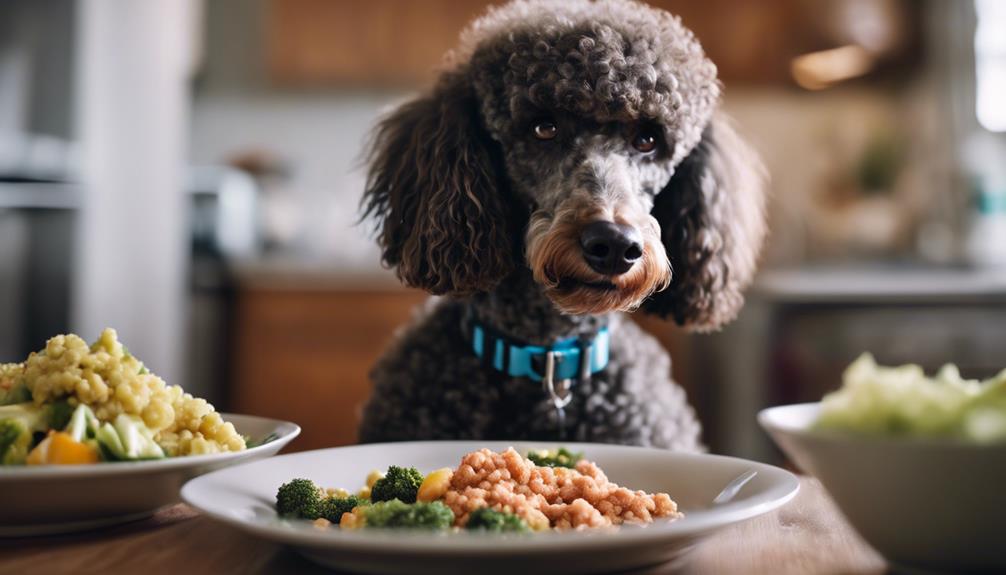
Switching to a grain-free diet for your diabetic poodle can be beneficial in managing their blood sugar levels more effectively. The lower carbohydrate content in grain-free food can help with weight management, a crucial aspect for diabetic poodles. Additionally, the higher protein content in grain-free diets can provide sustained energy for your furry companion.
Diabetic Poodle Nutritional Needs
To help manage blood sugar levels in diabetic Poodles, consider incorporating a grain-free diet tailored to their nutritional needs. Grain-free options can provide necessary energy without spiking blood sugar, benefiting diabetic Poodles. Avoiding grains like wheat and corn can help prevent unwanted weight gain in diabetic Poodles and promote better weight management. Consulting a vet for personalized dietary recommendations specific to diabetic Poodles is crucial for their well-being. Grain-free diets are a suitable choice for diabetic Poodles as they support overall health and can contribute to their improved quality of life.
Impact on Blood Sugar
Considering the impact on blood sugar, a grain-free diet tailored for diabetic Poodles can play a vital role in managing their condition effectively. Grain-free diets can help regulate blood sugar levels by preventing spikes, thus aiding in diabetic management. The lower carbohydrate content in grain-free food can support insulin sensitivity in diabetic Poodles, potentially reducing the need for insulin injections. It is crucial to consult with a vet to create a personalized grain-free diet that meets the unique nutritional requirements of diabetic Poodles. By carefully selecting the right grain-free options, diabetic Poodles can better control their blood sugar levels and overall health. Regular monitoring and adjustments, in collaboration with veterinary guidance, are essential for the successful implementation of a grain-free diet for diabetic Poodles.
Grain-Free Diet for Poodles With Cancer
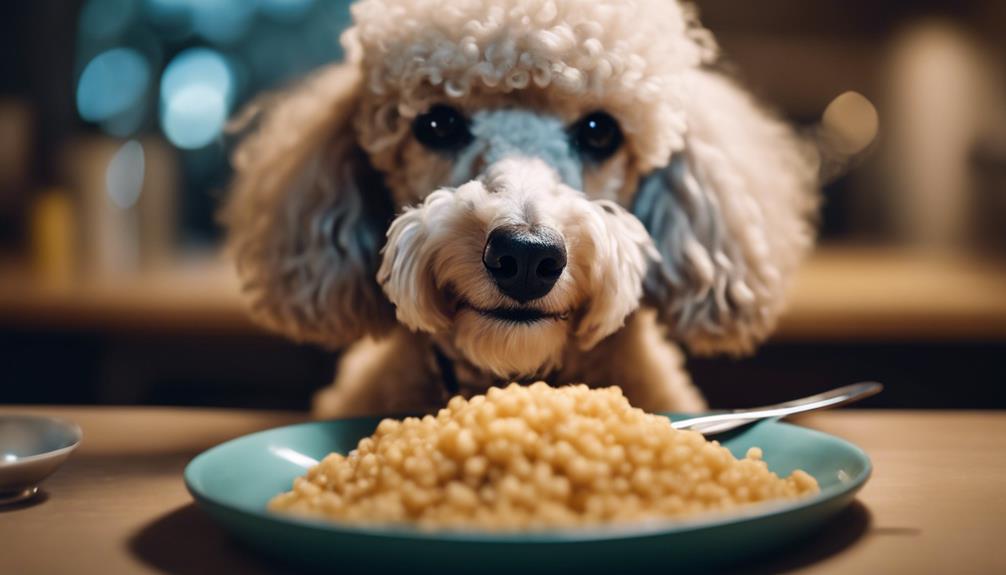
A grain-free diet can benefit poodles with cancer by helping manage blood sugar levels and supporting overall health and activity levels. Here are some key points to consider when feeding poodles with cancer a grain-free diet:
- Grain-free diets can assist in managing blood sugar levels and preventing weight gain in poodles with cancer.
- These specialized diets are formulated to support the overall health and activity levels of poodles undergoing cancer treatment.
- Options like Health Extension canned food provide balanced nutrition, making them ideal for diabetic or cancer-affected poodles.
- Consulting a veterinarian before transitioning to a grain-free diet for poodles with cancer is crucial to ensure the diet meets all their nutritional needs.
- Grain-free dog food can supply the necessary energy levels required for optimal activity in poodles battling cancer.
Cost Considerations of Grain-Free Diet
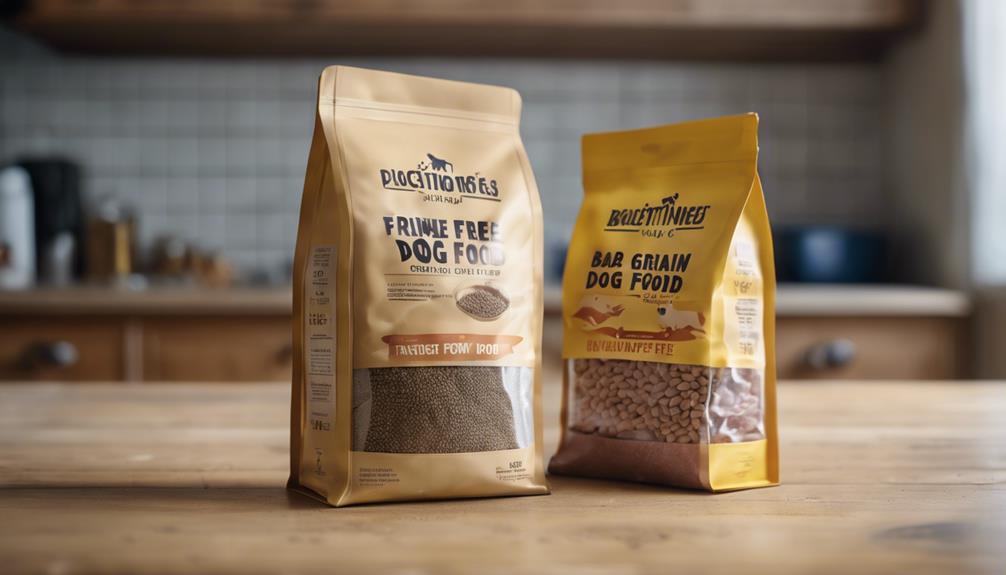
Grain-free dog food can be pricier than traditional options due to the use of higher quality ingredients and specialized formulations. Depending on the brand and specific nutritional needs of your Poodle, the cost of a grain-free diet may vary. Consider making budget adjustments to accommodate the long-term financial impact of feeding your Poodle a grain-free diet.
Cost of Specialty Ingredients
Specialty ingredients in grain-free dog food often come at a higher price point due to their superior quality and unique sourcing. When considering the cost of specialty ingredients in grain-free diets, it's important to understand what drives up the price:
- Premium proteins, such as high-quality meats and fish
- Exotic ingredients like bison, venison, or salmon
- Novel protein sources and unique ingredients
- The focus on providing high-quality, natural nutrition
- The benefits these specialty ingredients provide for your dog's health and well-being
While the cost of grain-free diets may be higher due to these specialty ingredients, many pet owners find the investment worthwhile for the premium nutrition they offer.
Budget Adjustments Needed
Considering the financial implications of opting for a grain-free diet for your poodle, it's essential to address the budget adjustments needed to sustain this dietary choice effectively. Grain-free dog food often comes at a higher price point compared to traditional options, which may pose a concern for poodle owners. To accommodate this change, financial planning becomes crucial to ensure your poodle consistently receives the necessary nutrition. Some poodle owners may need to allocate additional funds for premium grain-free food options to meet their pet's specific dietary needs. Budget considerations play a vital role in the successful transition of poodles to a grain-free diet, emphasizing the importance of planning ahead to maintain the long-term sustainability of this dietary choice.
Long-Term Financial Impact
How do the cost considerations of a grain-free diet impact your long-term financial planning for your Poodle? When considering the financial implications of feeding your Poodle a grain-free diet, it's essential to weigh the following factors:
- Expensive: Grain-free dog food can be more costly due to premium ingredients and specialized formulations.
- Budget Considerations: Pet parents should factor in their budget and ongoing expenses when opting for grain-free options.
- Quality Variation: The brand, ingredient quality, and package size can influence the overall cost of a grain-free diet.
- Health Benefits: While pricier, the potential health advantages and reduced allergy risks of grain-free diets may justify the higher cost.
- Long-Term Planning: Considering the long-term financial impact of choosing a grain-free diet is crucial for your Poodle's well-being.
Suitability for Active Poodles

Active Poodles can experience enhanced performance and sustained energy levels through a grain-free diet rich in protein. The high protein content in grain-free options supports their energy needs and helps maintain the muscle mass required for their active lifestyle. Additionally, the easily digestible nature of grain-free food aids in quicker recovery after intense physical activities, reducing the risk of digestive issues during high-energy exercise periods. For highly active Poodles, grain-free food provides sustained energy levels without the potential for bloating or gastrointestinal discomfort. Consider the table below for a quick overview of the benefits of a grain-free diet for active Poodles:
| Benefits of Grain-Free Diet for Active Poodles |
|---|
| Supports energy needs |
| Maintains muscle mass |
| Aids in quicker recovery |
| Reduces digestive issues |
| Provides sustained energy levels |
Addressing Picky Eaters Challenge
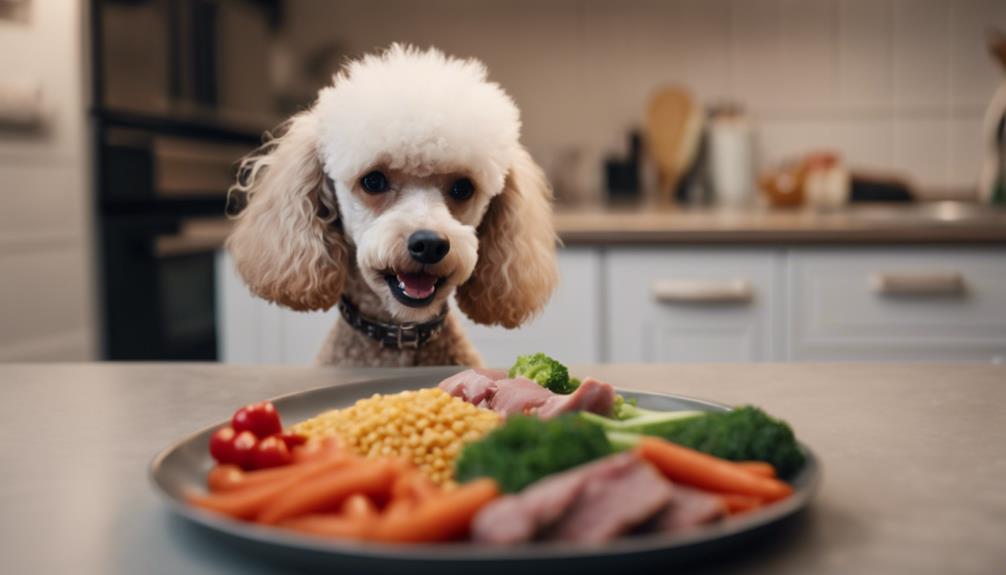
If your Poodle is a picky eater, introducing new grain-free options slowly can help them adjust to the taste and texture. Experiment with various protein sources to entice your discerning Poodle's palate. Mixing small amounts of grain-free food with their regular diet can encourage acceptance and prevent digestive issues.
Picky Poodle Eating Habits
When addressing the challenge of picky poodle eating habits, transitioning to a grain-free diet requires patience and strategic introduction methods. Picky eaters may resist grain-free options due to texture, taste, or unfamiliar ingredients. Here are some tips to help your poodle adjust:
- Slowly introduce small amounts of grain-free food mixed with their regular diet.
- Add flavorful toppers like bone broth or freeze-dried treats to entice them.
- Seek guidance from a veterinarian on transitioning to a grain-free diet.
- Consider the texture of the food when selecting grain-free options.
- Monitor your poodle's response and make adjustments accordingly to ensure a successful transition.
Tips for Picky Eaters
To address the challenge of picky eaters in poodles, gradually introducing new foods and using enticing mix-ins can help expand their palate and prevent mealtime struggles. Picky eaters may benefit from a variety of textures and flavors to cater to their preferences. Consider incorporating food toppers or mix-ins to make meals more appealing. Avoid free-feeding to establish regular meal times and reduce picky eating behaviors. When introducing new foods, do so gradually to prevent digestive upset. Consulting with a veterinarian can provide guidance on addressing picky eating habits in your poodle. By being patient and offering a diverse range of options, you can help your picky eater enjoy meal times and maintain a balanced diet.
Training for Food Preferences
To address the challenge of picky eaters in poodles, consider training them to prefer grain-free options through gradual introduction and positive reinforcement. Here are some tips to help you train your poodle to enjoy grain-free foods:
- Utilize food puzzles or interactive feeders to encourage trying new grain-free options.
- Rotate between different flavors and textures of grain-free food to overcome picky eating habits.
- Mix small amounts of wet grain-free food with dry kibble for a smoother transition.
- Be consistent and patient in training your poodle to accept and enjoy grain-free diet options.
Carbohydrate Levels in Grain-Free Diet
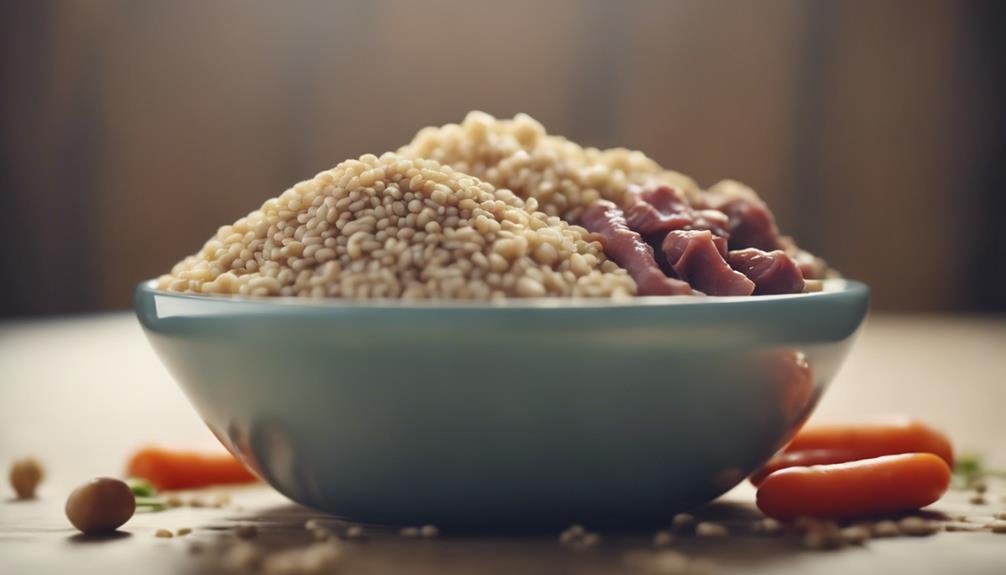
Carbohydrate levels in grain-free diets for Poodles can significantly impact their energy levels and weight management. These diets often utilize alternative carbohydrate sources such as sweet potatoes, peas, and lentils. It's crucial to note that the carbohydrate content in grain-free formulations can vary based on the specific ingredients used. While grain-free dog foods eliminate traditional grains, they may still contain carbohydrates from sources like potatoes or legumes. Monitoring and understanding the carbohydrate levels in these diets is essential for effectively managing a Poodle's energy and weight.
Potential Drawbacks of Grain-Free Diet
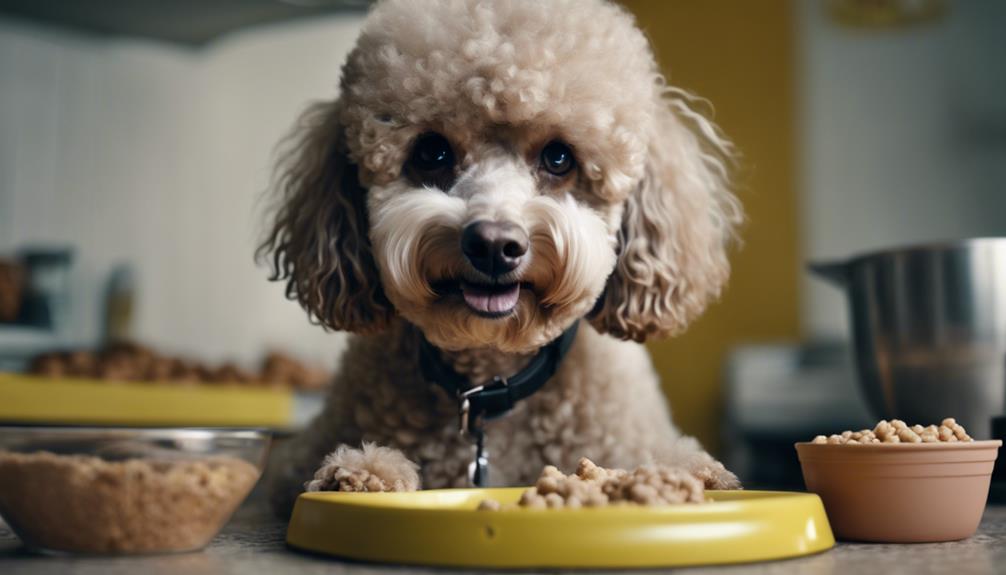
When considering a grain-free diet for your Poodle, it's important to be aware of the potential drawbacks associated with this dietary choice. While grain-free diets have gained popularity, there are certain aspects that poodle owners should consider:
- Nutritional Imbalances: Grain-free diets may lack essential nutrients found in grains, potentially leading to imbalances in your Poodle's diet.
- Heart Health Concerns: Studies have suggested a link between grain-free diets and an increased risk of dilated cardiomyopathy (DCM) in dogs, including poodles.
- Digestive Health Impact: Poodles on a grain-free diet might miss out on the fiber and other benefits provided by whole grains, which could impact their digestive health.
- Financial Considerations: The cost of grain-free dog food can be higher than traditional options, which might cause financial concerns for some poodle owners.
- Veterinary Guidance: Switching to a grain-free diet for your Poodle should be done under veterinary guidance to ensure their health and nutrition are optimized.
It's essential to weigh these potential drawbacks carefully before making a decision about your Poodle's diet.
Comparison: Grain-Free Vs. Grain-Inclusive Diets
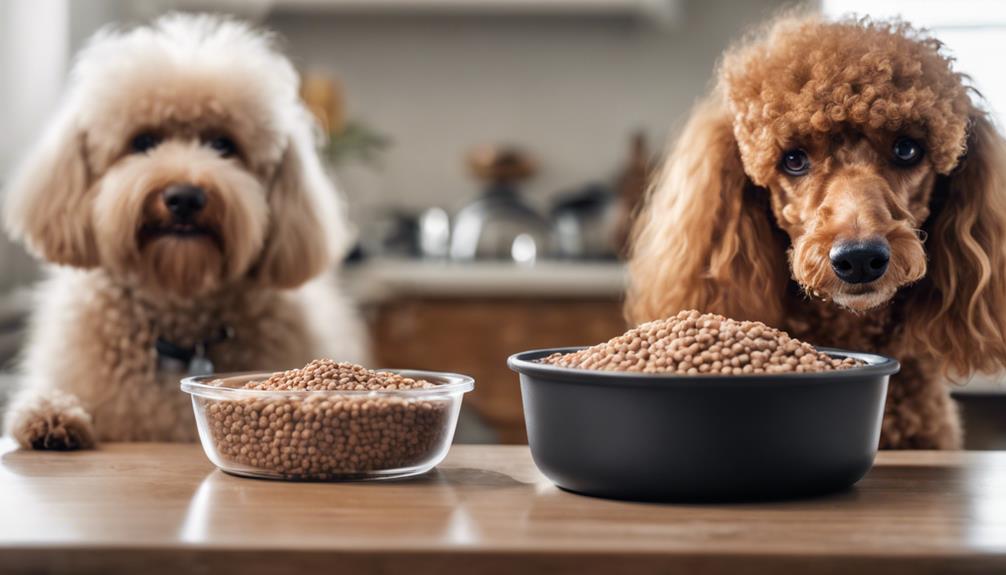
Choosing between a grain-free and grain-inclusive diet for your Poodle requires careful consideration of their specific dietary needs and potential benefits of each option. Grain-free diets may be beneficial for Poodles with grain allergies or sensitivities, as these diets eliminate common allergens. On the other hand, grain-inclusive diets provide essential nutrients such as fiber, vitamins, and minerals that are important for your Poodle's overall health and well-being. Some Poodles may thrive on grain-free diets due to improved digestion and reduced allergies, but it's essential to note that grain-free options can be more expensive than grain-inclusive diets. To ensure you make the best choice for your Poodle, consulting with a vet is crucial. Your vet can assess your Poodle's individual needs, allergies, and health conditions to recommend the most suitable diet – whether grain-free or grain-inclusive – to keep your furry friend healthy and happy.
Transitioning Poodles to Grain-Free Food
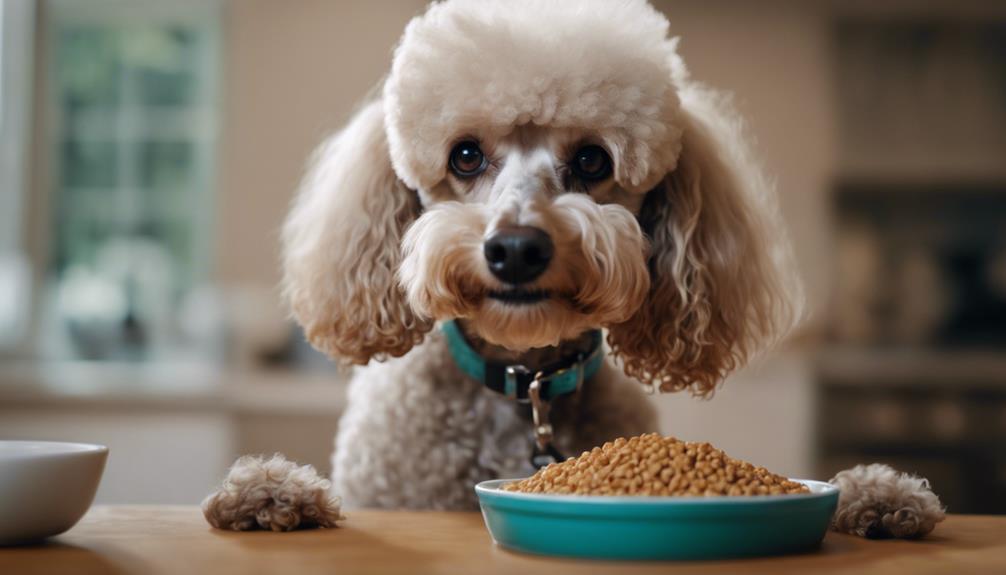
To smoothly transition your Poodle to a grain-free diet, gradually introduce the new food over a period of 7-10 days to prevent digestive issues. During this transition period, monitor your poodle's stool consistency, energy levels, and overall health closely. Here are some tips to help you with the process: Start by mixing a small amount of the grain-free food with your Poodle’s current diet, gradually increasing the proportion of the new food each day. If your dog experiences digestive discomfort, consider incorporating homemade meals for Poodles, as these allow you to have greater control over the ingredients and ensure a gentle adjustment. Always consult your veterinarian to ensure the new diet meets all of your Poodle’s nutritional needs.
- Offer a mix of the old and new food to facilitate the switch and ensure acceptance.
- Consult your vet for guidance on transitioning and selecting the right grain-free food tailored to your poodle's specific needs.
- Keep an eye out for any signs of allergies or sensitivities as you introduce the new grain-free diet to your poodle.
- Observe how your poodle reacts to the new food, looking for any digestive upset or changes in behavior.
- Remember that each poodle is unique, so the transition period may vary in length based on your individual dog's needs.
Expert Recommendations for Poodle Nutrition
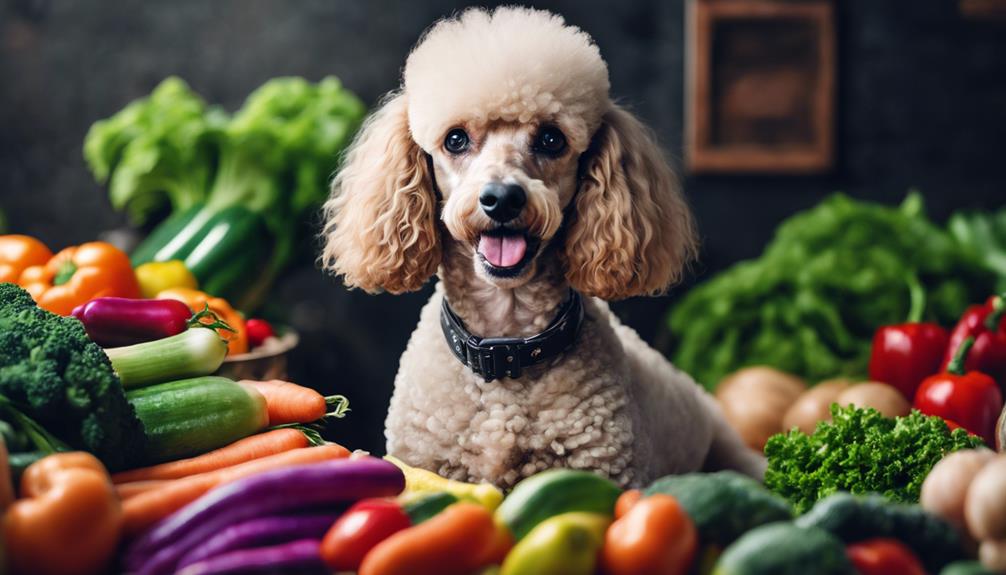
What key considerations should you keep in mind when evaluating expert recommendations for your Poodle's nutrition needs? Poodles, known for their predisposition to food allergies, often benefit from a grain-free diet to help manage sensitivities. When seeking advice for your poodle's nutrition, experts recommend prioritizing high-quality protein sources and ensuring essential nutrients are included in their meals. Grain-free options such as sweet potatoes and peas can offer necessary carbohydrates for your poodle's balanced diet. It is crucial to consult with a veterinarian before making significant changes to your poodle's food regimen. Veterinarians can provide personalized recommendations and guidance on transitioning your poodle to a grain-free diet tailored to their specific needs. Additionally, closely monitoring your poodle's response to the new diet is essential to assess how well they are adapting and to ensure their overall health and well-being are maintained. Trusting expert advice and working collaboratively with a veterinarian can help support your poodle's nutritional requirements effectively.
Frequently Asked Questions
Is Grain Free Dog Food Good for Poodles?
For poodles, grain-free dog food can be beneficial for their nutritional needs, digestive health, and allergy concerns. It may aid in weight management, provide quality ingredient sourcing, promote coat health, and potentially improve behavioral changes.
What Is the Downside to Grain Free Dog Food?
When considering grain-free dog food, be aware of potential drawbacks. Nutritional imbalances, weight gain risks from high protein, and lower fiber levels impacting satiety are concerns. Consult vets, research thoroughly for informed decisions on your pet's health.
Should Doodles Eat Grain Free?
For doodles, a grain-free diet can support nutritional balance, digestive health, and prevent allergies. It aids in weight management, enhances coat quality, boosts energy levels, and promotes dental health. Consult with a vet to ensure suitability.
What Is Better for Dogs Grain or Grain Free?
Choosing between grain and grain-free diets for your dog depends on their specific needs. Ensure nutritional balance, aid digestive health, prevent allergies, manage weight, boost energy levels, maintain skin/coat, and promote dental health. Consult a professional for tailored advice.
Conclusion
As you navigate the decision of whether to switch your Poodle to a grain-free diet, consider the potential benefits and drawbacks carefully. Picture your furry companion with a shiny coat, boundless energy, and a happy tummy. Consult with your veterinarian to ensure the best choice for your Poodle's health and well-being. Remember, a tailored approach to nutrition is key to keeping your four-legged friend thriving and wagging their tail with joy.
